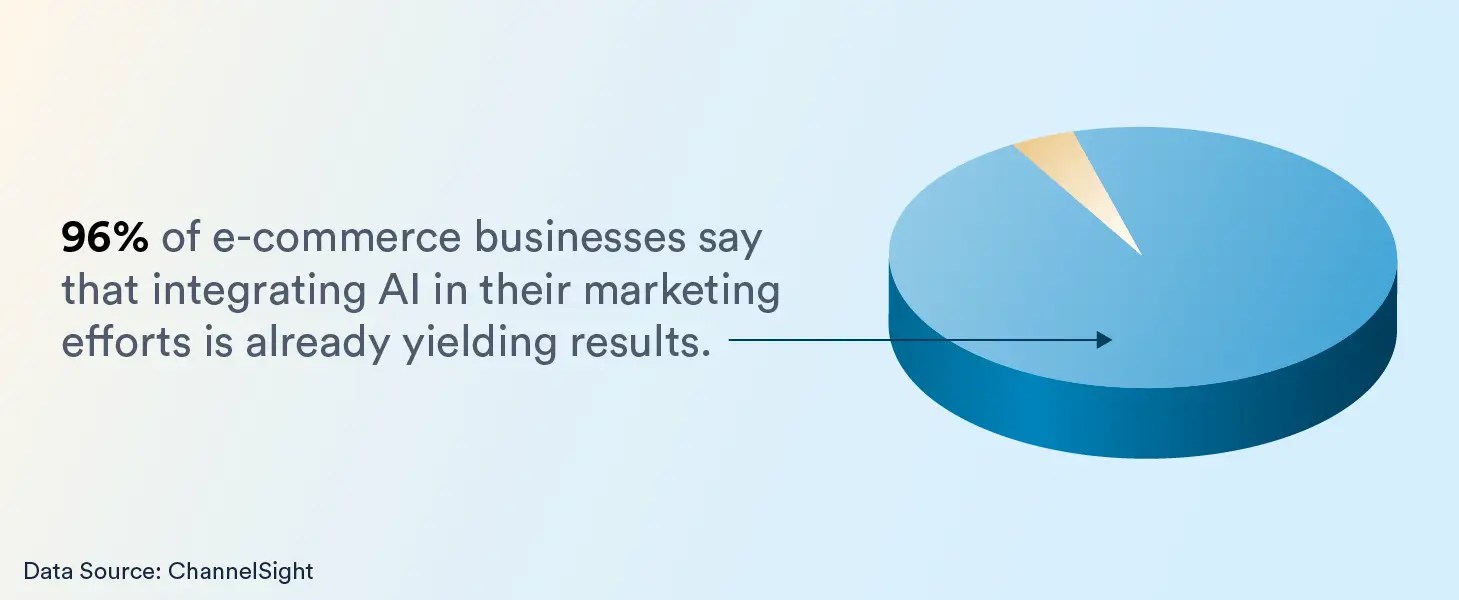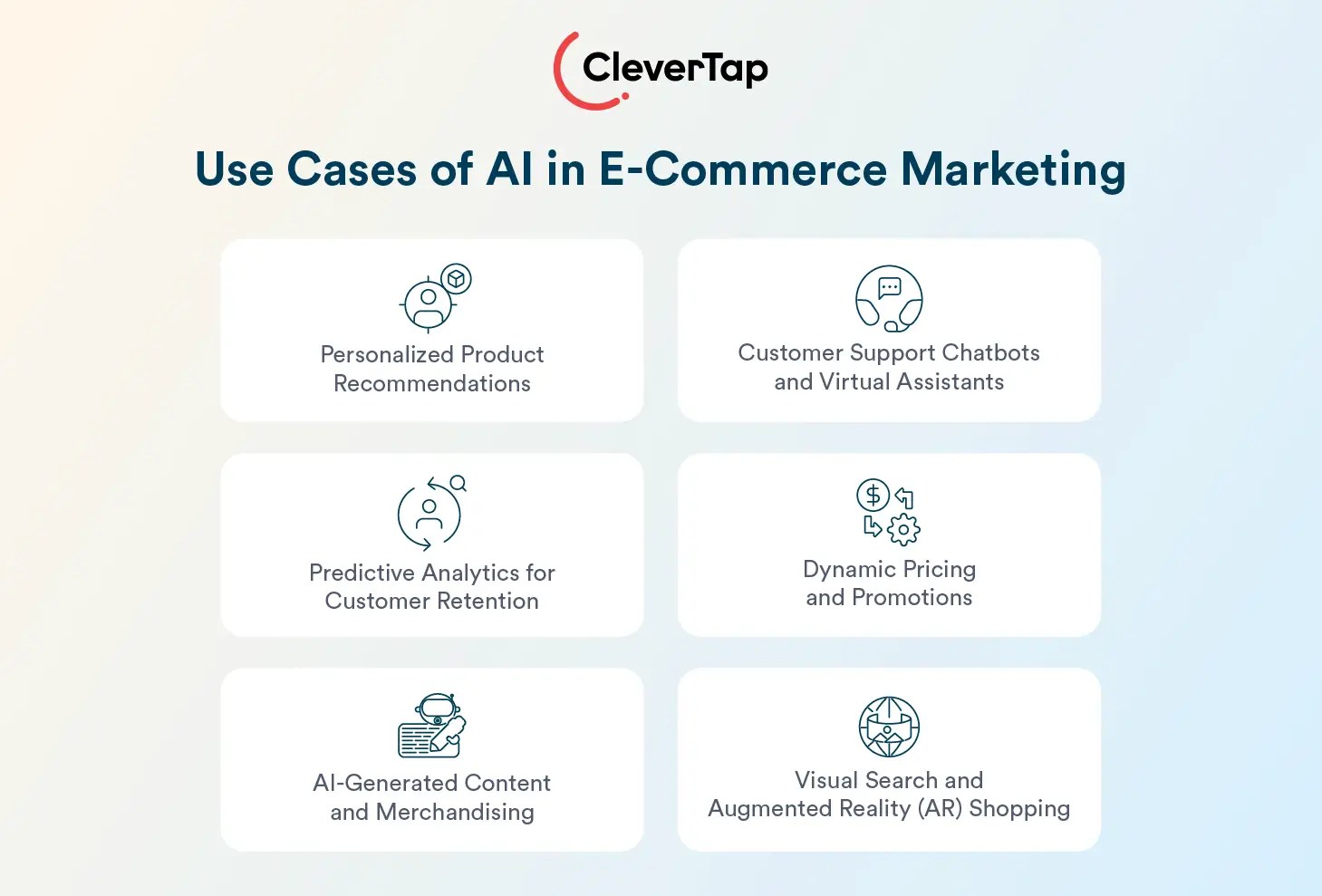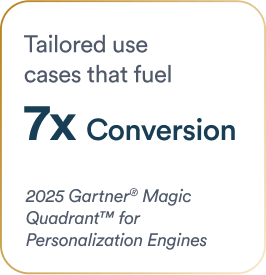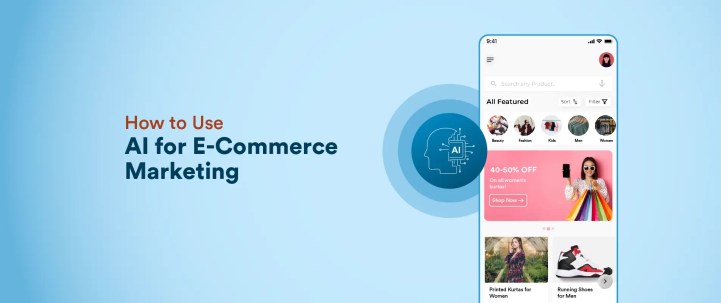Artificial intelligence (AI) is changing how e-commerce companies engage and retain customers. In this guide, we’ll explore practical ways to use AI in e-commerce to boost customer loyalty, improve campaign efficiency, and drive higher lifetime value.
Importance of AI in E-commerce Marketing
In e-commerce marketing, today’s customers expect personalized experiences, instant service, and hyper-relevant recommendations—at scale. 96% of e-commerce businesses say AI integration is already delivering results, helping them stay ahead.

In fact, CleverTap’s AI-powered personalization and customer segmentation tools have increased conversions by 35% and improved customer stickiness by 15%. For marketers, this isn’t just about engagement—it directly impacts revenue, customer lifetime value, and retention.
With 70% of businesses considering AI critical to operations and 90% of executives prioritizing AI-driven personalization, it’s clear that it is transforming marketing. For e-commerce marketers facing rising acquisition costs and retention challenges, AI is the key to scaling smarter, personalizing at scale, and staying ahead in a crowded market.
What is AI in E-commerce?
AI in e-commerce powers hyper-personalization, optimizes marketing campaigns in real time, and predicts customer behavior. At its core, AI allows businesses to analyze vast amounts of data, automate decision-making, and scale smarter. Key AI technologies include:
- Machine Learning (ML): Drives sales through hyper-personalized recommendations, analyzing customer behavior, purchase history, and browsing patterns. Amazon attributes 35% of its total sales to AI-powered recommendations.
- Natural Language Processing (NLP): Improves customer service and reduces support costs with AI-driven chatbots and virtual assistants.
- Computer Vision (CV): Enhances product discovery through visual search, allowing customers to find products by uploading images instead of typing queries. 36% of consumers already use visual search, making it a must-have for retailers in fashion, home decor, and beauty.
- Data Mining and Analytics: Increases retention by identifying meaningful customer patterns and predicting shopping trends.
Using these AI capabilities helps e-commerce businesses serve each customer in a more tailored way and at a scale that would be impossible to achieve manually.
Benefits of Using AI in E-commerce Marketing
Using AI in e-commerce marketing delivers game-changing benefits that directly impact customer satisfaction and business performance:
Enhanced Personalization & Customer Experience
AI enables “segment of one” marketing, treating each customer as unique. There are features that allow marketers to dynamically adjust app experiences that resonate with the individual taste.
Successful AI-driven personalization makes customers feel understood and valued, fostering customer loyalty and increasing the likelihood of repeat purchases. Even large-scale retailers can recreate the feel of a personal shopkeeper who knows each customer’s preferences.
Increased Efficiency & Cost Savings
AI automates routine marketing and customer service tasks. Chatbots can resolve common queries instantly, while marketing AI tools manage advertising, email scheduling, and budget allocation in real time.
This frees marketers to focus on strategy and creative work. AI’s predictive accuracy reduces waste by forecasting demand to avoid overstocking and automating testing to quickly find what works best, delivering strong ROI by improving productivity and decreasing costs.
Higher Conversion Rates
AI-driven features directly drive more conversions through personalized recommendations and dynamic content that keep customers engaged and encourage larger basket sizes.
Recommendation engines inspire additional purchases customers might not have considered. AI can also optimize pricing through algorithms that adjust based on demand, inventory levels, or individual willingness to pay, leading to significantly higher overall revenue.
Better Customer Retention
AI tools like automated RFM analysis can help identify customers at risk of churning, enabling proactive engagement with reactivation campaigns. It determines the optimal time and channel to reach each customer, increasing response likelihood.
AI-driven loyalty programs can tailor rewards to individual behavior, making the loyalty experience more compelling and improving customer lifetime value.
Learn more about using RFM in e-commerce.
Competitive Advantage
Adopting AI gives e-commerce businesses a significant edge through superior customer service and hyper-relevant marketing. It enables faster reactions to market changes and positions early adopters as innovators.
Key Components and Practical Applications of AI in E-commerce To Boost Your Marketing Strategy
AI in e-commerce marketing combines multiple systems working together to enhance marketing strategy. Let’s break down some of the most important practical applications and use cases of AI in e-commerce marketing, particularly from a retention and customer engagement perspective:

Data Analytics and Customer Data Platforms (CDPs)
AI-powered analytics platforms aggregate data from all customer touchpoints to reveal patterns. These systems evolve analytics from descriptive (what happened) to predictive (what will happen) and prescriptive (what actions to take). This foundational component feeds intelligence to all other AI marketing activities.
Personalization Engines and Recommendation Systems
With AI, you can improve conversions and customer lifetime value with hyper-personalized shopping experiences. Personalized product recommendations alone account for 31% of online retailers’ revenue, making AI personalization a must-have for brands looking to scale.
- Personalized Shopping Experience: AI analyzes browsing behavior, purchase history, and contextual data to deliver tailored product recommendations, dynamic homepage displays, and personalized email content.
- Dynamic Pricing and Promotions: AI algorithms adjust prices in real time based on supply, demand, customer segments, and competitor pricing. They can personalize promotions for different customer segments based on conversion likelihood, ensuring businesses don’t miss opportunities with price-sensitive shoppers while maintaining margins with loyal customers.
Learn more about e-commerce personalization.
AI Agents and Embedded Co-Pilots
AI-driven conversational agents handle customer inquiries and provide shopping assistance via text or voice. Using NLP, they can answer a range of questions. On the support side, they answer FAQs, provide order updates, and troubleshoot basic issues. On the sales side, chatbots can serve as shopping assistants – for instance, helping users find products via a quiz or offering style advice.
Brands using AI-powered co-pilots not only save on support costs but also increase revenues by up to 25%. These assistants are available 24/7, scale effortlessly, and maintain consistent service.
Having an always-available, helpful chatbot improves the overall customer experience – shoppers know they can get instant answers anytime, which builds trust and satisfaction.
Predictive Analytics and Scoring Models
These models forecast customer behaviors like churn risk, allowing timely intervention with win-back campaigns.
AI can predict customer lifetime value early in relationships to identify high-value customers. Other applications include demand forecasting and propensity scoring. These tools help marketers shift from reactive to proactive strategies.
Content Creation and Automation Tools
Generative AI creates content based on prompts, automating product descriptions, blog posts, and marketing emails.
Tools like CleverTap’s Scribe can generate emotionally intelligent AI-generated ad variants, email copies, push notifications, and social media posts. While human oversight ensures quality, these systems significantly accelerate content production and campaign optimization.
Visual Search and Augmented Reality (AR)
Visual search lets users find products by taking photos of items they like. Retailers like Pinterest and ASOS have introduced features where a user can snap a photo of an item and find similar products available for purchase. This is a powerful acquisition and engagement tool that turns real-world inspiration into online shopping with minimal friction.
These components form an AI-enabled marketing stack that creates cohesive customer journeys, enabling more proactive, personalized, and responsive interactions with customers.
Real-World Examples of Brands Using AI in E-commerce Marketing
Nothing illustrates the impact of AI better than real-world success stories. Here are a few noteworthy examples of e-commerce businesses using AI in their marketing and the results they’ve seen:
Ajio Used AI in E-commerce Marketing to Boost Engagement and Retention
Ajio, one of India’s leading fashion e-commerce platforms, leveraged CleverTap’s AI-driven marketing to enhance customer engagement, personalization, and retention. By integrating AI-powered predictive analytics, Ajio refined audience targeting, optimized campaign timing, and delivered real-time personalized recommendations. AI-driven churn prediction models helped identify at-risk customers, enabling proactive retention efforts with tailored incentives.
Additionally, CleverTap’s AI-powered attribution provided deeper insights into customer journeys, optimizing marketing spend for maximum ROI. Conversational AI further enhanced scalability by automating customer interactions across multiple touchpoints. As a result, Ajio achieved higher engagement, improved retention, and more efficient marketing operations.
Amazon’s Recommendation Engine
Amazon’s AI-powered recommendation engine drives 35% of the company’s sales. When shopping on Amazon, AI suggests frequently bought-together items, similar products, or reminders of previously browsed items. It also uses generative AI to personalize product recommendations and descriptions.

Source: Amazon
This personalization engine keeps customers engaged and increases purchase rates. AI also assists with dynamic pricing and inventory forecasting, but its marketing strength lies in ensuring customers see relevant products. Other businesses can leverage AI recommendations to boost upselling and cross-selling, enhancing revenue significantly.
The North Face’s AI-Powered Shopping Assistant
Apparel retailer The North Face implemented an AI chatbot using IBM Watson’s cognitive computing. The chatbot asks customers questions about their needs—such as activity type and climate—before recommending suitable jackets.

Source: Modev
This conversational experience mimics a knowledgeable sales associate, reducing decision fatigue. Within months of launch, it achieved a 75% conversion rate among interacting customers. This early experiment in needs-based AI selling demonstrated that AI could successfully guide customers, improving both sales and customer satisfaction.
Sephora’s Chatbots and Virtual Artist
Sephora has embraced AI in multiple ways. Its chatbots on messaging platforms answer beauty questions and help customers book in-store appointments, achieving an 11% higher conversion rate for bookings than other channels.

Source: Sephora
Another innovative AI tool, Sephora’s Virtual Artist, allows users to try on makeup virtually using facial recognition and computer vision. This AR-powered experience boosts online sales by increasing confidence in product choices while keeping users engaged. Sephora’s AI integration enhances the omnichannel shopping experience, merging online convenience with personalized beauty advice.
Starbucks’ Personalization Engine (“Deep Brew”)
While not a traditional retail e-commerce site, Starbucks’ application of AI in their mobile app and marketing is highly relevant to retention. Starbucks uses AI to personalize marketing via its Deep Brew platform. By analyzing purchase data from its loyalty app, Deep Brew tailors offers to individual customers.

Source: Unsplash
For example, a regular coffee buyer may receive a discount on a breakfast sandwich, while another customer might be incentivized to try a new latte flavor. These AI-driven personalized rewards and recommendations have increased engagement and spending per customer. Starbucks’ model proves that AI personalization isn’t limited to retail—it benefits any business focused on customer frequency and loyalty.
ASOS’s Customer Service Chatbot (“Enki”)
ASOS, a UK-based fashion retailer, introduced an AI chatbot named Enki to assist customers with sizing and fit recommendations. By collecting body measurements and preferences, Enki reduces uncertainty about fit, leading to fewer returns and more confident purchasing.


Source: Econsultancy
ASOS also leverages AI for visual search—allowing customers to upload a photo of an outfit and find similar items on ASOS. These AI features improve customer experience and differentiate ASOS in a competitive market while reducing operational costs related to returns.
Steps to Implement AI in E-commerce Marketing
Implementing AI in your e-commerce marketing might feel daunting, but it can be tackled step by step using the structured approach below:
1. Assess Your Needs and Goals: Begin by identifying the key challenges or opportunities in your current marketing strategy.
Ask questions like: Where could we personalize more? Which processes are eating up a lot of time? Are we failing to retain certain customer segments? Pinpointing specific pain points or objectives will help determine which AI applications make sense.
2. Build the Data Foundation: AI runs on data, so ensure you have the necessary data infrastructure in place. This means consolidating customer data from all sources: website analytics, CRM, email marketing platform, loyalty program, customer service logs, etc.
The data should also be clean and well-organized (for instance, consistent customer IDs to track behavior across sessions, updated product data with correct tags, etc.). The quality of your AI outcomes will depend on the quality of the data you feed in.
3. Choose the Right AI Tools/Partners: Research and select solutions that fit your identified needs, such as personalization engines, AI-driven email optimization, or chatbots.
Evaluate based on integration ease, customization level, and pricing. Ensure tools can report results tied to your goals (e.g., did the AI personalization increase conversions? Did the chatbot deflect support tickets?).
4. Start with a Pilot Project: Begin with one or two high-impact initiatives to manage implementation tightly and learn along the way. Set up A/B tests to prove value before larger investment.
5. Train and Integrate the AI System: Configure the system by feeding historical data to train machine learning models. Ensure proper connections to your website, app, and marketing platforms.
6. Monitor, Measure, and Iterate: Track both quantitative metrics and qualitative aspects of performance. Fine-tune algorithms based on observations and expand successful features while adjusting underperforming ones.
7. Scale Up and Expand AI Initiatives: After successful pilots, integrate AI across more channels or use cases. Create an “AI roadmap” with planned projects and timelines for gradual implementation.
8. Analyze Results and Iterate Strategy: Periodically evaluate the overall impact on marketing KPIs and business goals, using insights to inform your next strategic cycle. Stay current with emerging AI capabilities through industry resources.
These steps can make AI implementation manageable and aligned with real business value. Keep the long-term vision in mind: you’re building capabilities that will serve your e-commerce brand for years to come, enabling scalable personalization and automation.
AI in E-commerce: Key Challenges and Strategic Solutions
While AI offers tremendous benefits for e-commerce marketing, it’s not without challenges. As you implement and use AI, be mindful of the following:
Data Privacy and Security
Consumers are increasingly concerned about data privacy, with regulations like GDPR and CCPA mandating strict compliance. In a survey, 52% of companies cited privacy concerns as a primary AI adoption barrier.
Solution: To address this, enforce strong data governance: collect only essential data, secure it with encryption, and anonymizeit where possible. CleverTap empowers businesses to thrive in this environment by providing an advanced platform that enables personalized, consent-driven marketing while staying fully within the regulatory perimeter.
Integration and Technical Complexity
Integrating AI into existing e-commerce systems can be challenging, with 31% of companies citing data silos and legacy systems as obstacles.
Solution: AI tools built into platforms can simplify adoption. For advanced implementations, IT teams may need to map data flows and optimize APIs. Careful planning and cross-team coordination are crucial for smooth integration.
Accuracy and Quality of AI Outputs
AI recommendation engines may suggest irrelevant products, and chatbots can misinterpret queries.
Solution: To maintain accuracy, set up feedback loops (e.g., thumbs-up/down ratings) and periodically review AI decisions. The “cold start” problem (lack of data for new users or products) can be mitigated with fallback strategies like bestseller lists. Keep human oversight in key areas to refine AI outputs over time.
Avoiding Over-Automation
AI should enhance, not replace, human interaction. Over-automation risks making customer experiences feel impersonal.
Solution: Balance AI use by having marketers review AI-generated content and enabling chatbot handoffs to human agents for complex issues. Transparency—such as informing users they are interacting with AI—also builds trust.
Bias and Ethical Concerns
AI can reinforce biases, such as skewed product recommendations.
Solution: Ensure AI-driven segmentation is fair and ethical. Avoid manipulative practices like discriminatory pricing. Additionally, verify AI-generated content for accuracy.
Future Trends in AI for E-commerce Marketing
AI in e-commerce continues to evolve rapidly, with several emerging technologies transforming online marketing strategies:
- Conversational commerce and voice shopping are growing as NLP improves. AI-powered assistants will facilitate routine purchases and enhance shopping experiences on messaging platforms.
- Hyper-personalization with real-time AI will advance beyond using historical customer profiles. AI in e-commerce marketing will use contextual data such as weather, location, and real-time behavior to create instant, unique shopping experiences.
- AR/VR commerce enhanced by AI will allow customers to visualize products in their environment with increasing realism.
- AI-driven loyalty programs will move beyond static point systems, where AI will dynamically tailor rewards based on individual behaviors.
- Emotion AI and advanced analytics will gauge customer sentiment in real time through text, voice, or facial expressions, allowing marketers to intervene at critical moments or adjust messaging based on detected emotions.
- Integration with supply chain AI will enable marketing systems to communicate with logistics, adjusting promotions based on inventory levels or proactively managing customer expectations during delays.
AI is Reshaping E-commerce
Looking ahead, AI will make commerce more intuitive, proactive, and immersive while paradoxically creating more personal customer interactions. Retention marketers should experiment with technologies that align with their specific audience and products, recognizing that not every innovation suits every brand.
The goal remains to build stronger customer relationships through seamless, personalized experiences. As AI handles implementation, marketers can focus on creative strategies and human touches. Companies that blend AI capabilities with empathetic marketing will lead in the evolving e-commerce landscape.
Jacob Joseph 
Heads Data Science.Expert in AI, Data & Analytics and awarded 40 under 40 Data Scientists in India.
Free Customer Engagement Guides
Join our newsletter for actionable tips and proven strategies to grow your business and engage your customers.














































